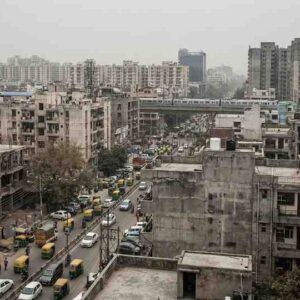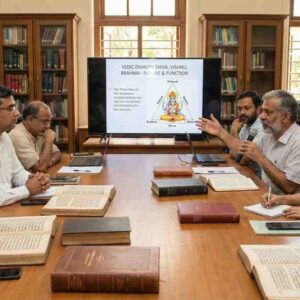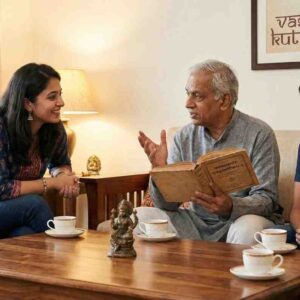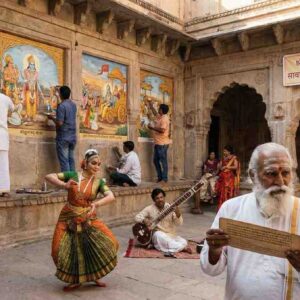Grassroots Leadership and the Interplay Between Tradition and Governance
Lucknow– Uttar Pradesh, the beating heart of India’s political machinery, offers a fascinating study of how deeply rooted local philosophies influence the political landscape. From the bustling municipalities of urban centers to the serene panchayats of rural regions, the governance of this state is a reflection of the cultural, social, and philosophical undercurrents that define its communities. Pradhans, sarpanchs, and paarshads are not just administrators; they are custodians of local values that shape political ideologies across the spectrum.
A Glimpse Into Local Governance
Rural Governance: The Panchayati Raj System
Uttar Pradesh boasts a robust Panchayati Raj system with over58,000 gram panchayats, each serving as a microcosm of rural democracy. These grassroots institutions are the foundation of governance in villages, addressing everyday issues such as water management, education, and health.
- Leadership Dynamics: Pradhans, often elected through intense local competition, represent the dominant caste or socio-economic group in their regions. Their governance reflects the collective ethos of their communities, steeped in traditional values.
Urban Governance: Municipal Corporations and Councils
Urban areas in Uttar Pradesh are governed by17 municipal corporationsand199 municipal councils, ensuring the delivery of essential services and infrastructure development. Paarshads (councilors) act as the bridge between citizens and higher political authorities, focusing on hyper-local issues such as sanitation, street lighting, and public amenities.
- Development-Centric Ideals: In cities like Kanpur and Lucknow, municipal governance revolves around modernization and civic engagement, aligning closely with progressive political ideologies.
Local Philosophies Influencing Political Thought
1. Community-Centric Governance
The age-old philosophy of collective decision-making remains central to governance in Uttar Pradesh. Leaders often prioritize policies that resonate with the community’s shared values, fostering a sense of belonging and responsibility.
- Example: In several districts, pradhans have initiated water conservation projects through collective participation, reflecting the Gandhian ideal of self-reliance.
2. Caste and Political Identity
Caste continues to be a defining factor in local politics, influencing electoral outcomes and policy decisions. Leaders often emerge from dominant caste groups, and their political ideologies are shaped by the socio-economic realities of their communities.
- Case Study: In eastern Uttar Pradesh, Dalit women pradhans have leveraged their positions to champion literacy and health initiatives, embodying Ambedkarite principles of equality and social justice.
3. Traditional Authority in Modern Roles
Local governance often carries the legacy of traditional leadership structures. While modern governance systems have formalized roles such as sarpanchs and pradhans, these positions often retain the respect and influence of historical authority figures.
Challenges in Local Governance
1. The Persistence of Caste Hierarchies
Despite the democratization of leadership roles, caste often dictates access to resources and opportunities. Dominant caste groups may sideline marginalized communities, perpetuating inequalities.
2. Corruption and Nepotism
Mismanagement of funds and favoritism remain persistent challenges, especially in resource allocation for development projects.
3. Limited Resources and Training
Many grassroots leaders lack the training or tools required to effectively address modern challenges such as climate change or urban migration, which demand innovative solutions.
4. Politicization of Local Issues
The trickle-down effect of state and national political agendas often polarizes local governance, diverting attention from pressing community concerns.
Ground-Level Reports and Official Initiatives
Digital Governance
Uttar Pradesh is embracing technology to enhance local governance through platforms likeUMANG (Unified Mobile Application for New-Age Governance). This initiative simplifies citizen access to government services, promoting transparency and accountability.
Water Management
The state’sGround Water Management Systemallows communities to register wells, obtain NOCs, and address grievances online, integrating traditional water conservation practices with modern regulatory frameworks.
Women’s Leadership
With33% of seats reserved for womenin local bodies, female leaders are driving initiatives such as menstrual hygiene campaigns and community health programs.
Philosophical Foundations of Governance
Gandhian Principles
The legacy ofGram Swaraj, or village self-rule, remains central to rural governance. Gandhi’s vision of self-reliant communities is echoed in initiatives like community farming and cooperative enterprises led by local panchayats.
Ambedkarite Ideals
Dr. B.R. Ambedkar’s advocacy for inclusive governance is evident in the increasing representation of marginalized communities in local bodies. This has led to more equitable policies, especially in Dalit-majority areas.
Sufi-Bhakti Traditions
The syncretic philosophies of Sufi saints and Bhakti poets inspire interfaith dialogues and communal harmony in areas with diverse populations, such as Amroha and Budaun.
The Way Forward
- Empowering Leaders
- Expand training programs for pradhans and paarshads to enhance their administrative and conflict-resolution skills.
- Promoting Transparency
- Leverage technology to monitor fund allocation and project implementation, ensuring accountability at every level.
- Strengthening Community Participation
- Encourage greater involvement of citizens in decision-making processes, fostering a shared sense of responsibility.
- Fostering Social Harmony
- Organize cultural and educational programs rooted in Sufi-Bhakti traditions to promote unity across diverse communities.
Conclusion: A Unique Political Ecosystem
Local governance in Uttar Pradesh is a fascinating interplay of tradition and modernity. By drawing on philosophies of collective responsibility, equality, and harmony, grassroots leaders not only address community challenges but also shape the broader political landscape.
As Uttar Pradesh navigates its future, its ability to blend local philosophies with progressive governance will define its success in creating an inclusive and resilient society. The state’s pradhans, sarpanchs, and paarshads are not just leaders—they are the custodians of its rich cultural and philosophical heritage.













